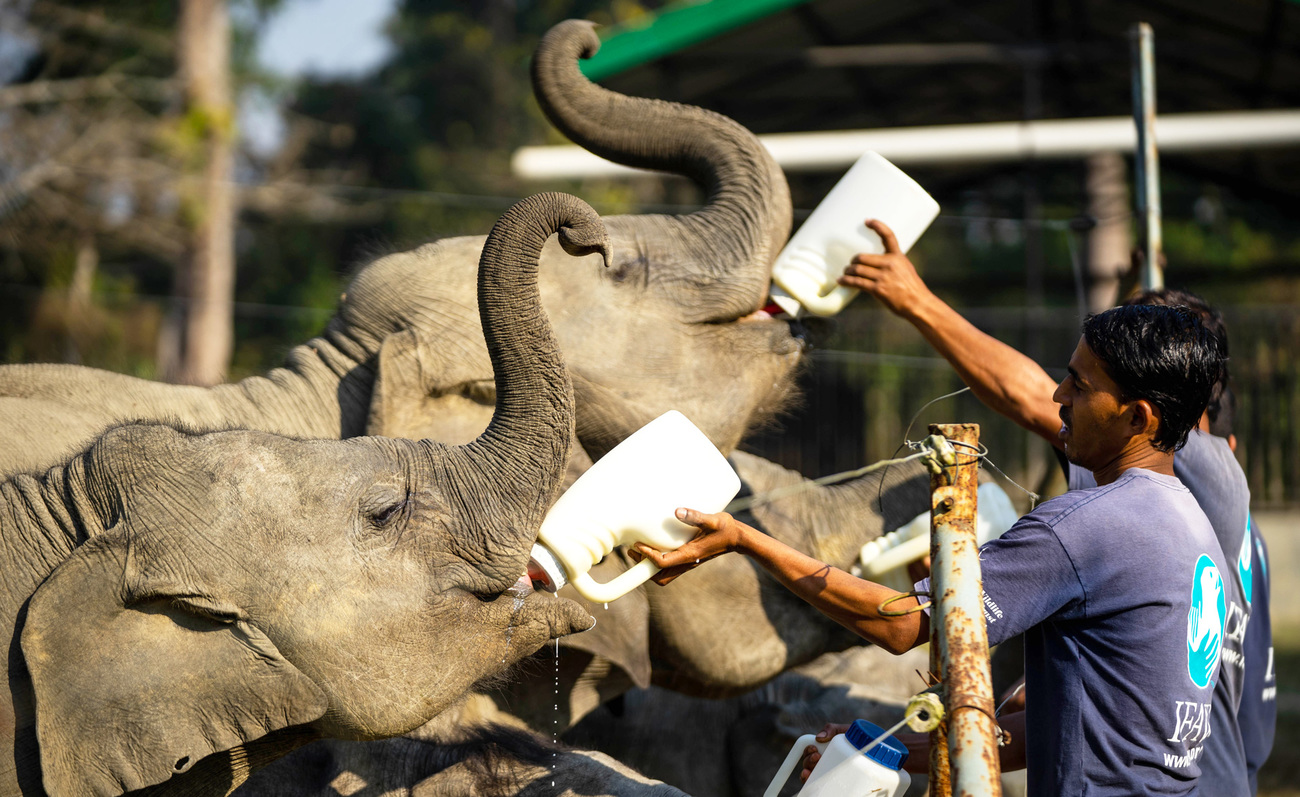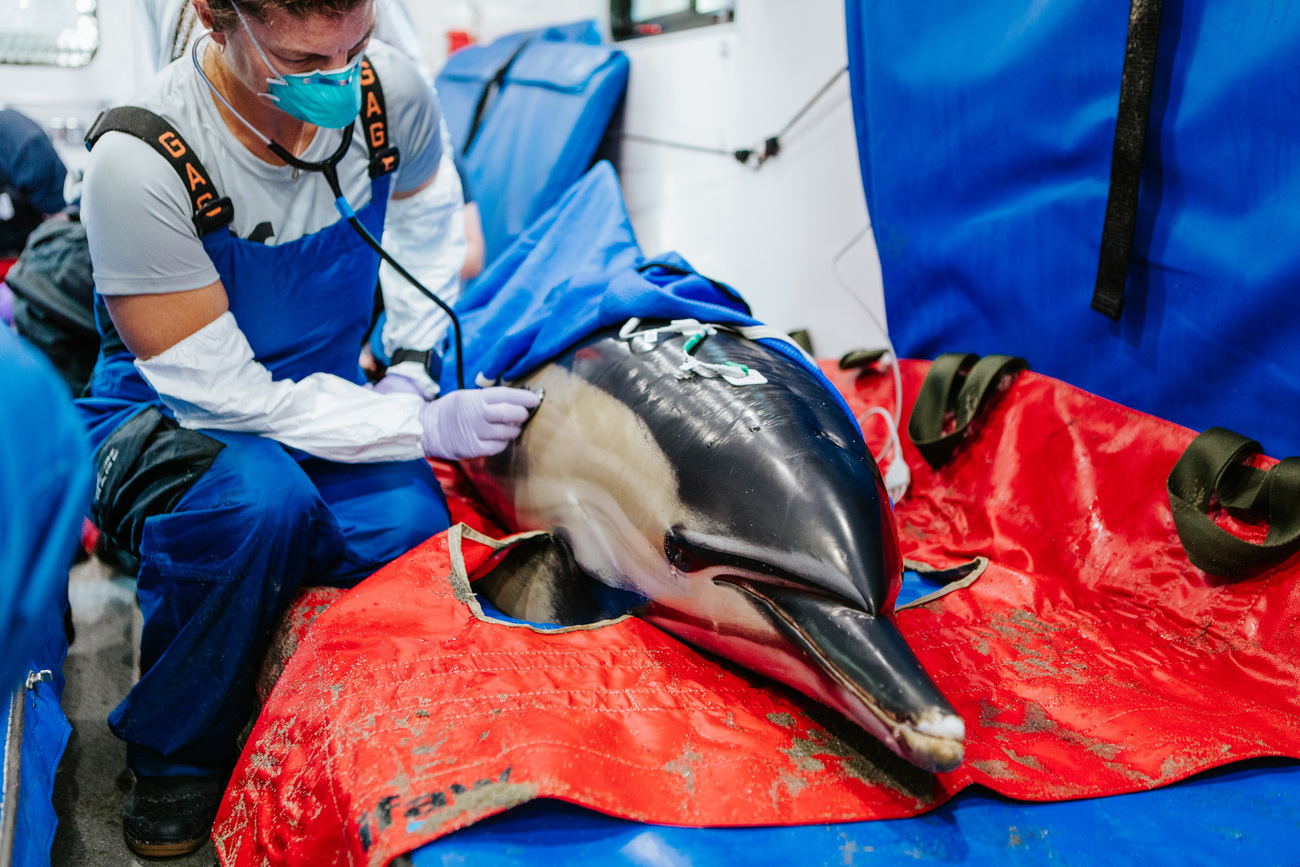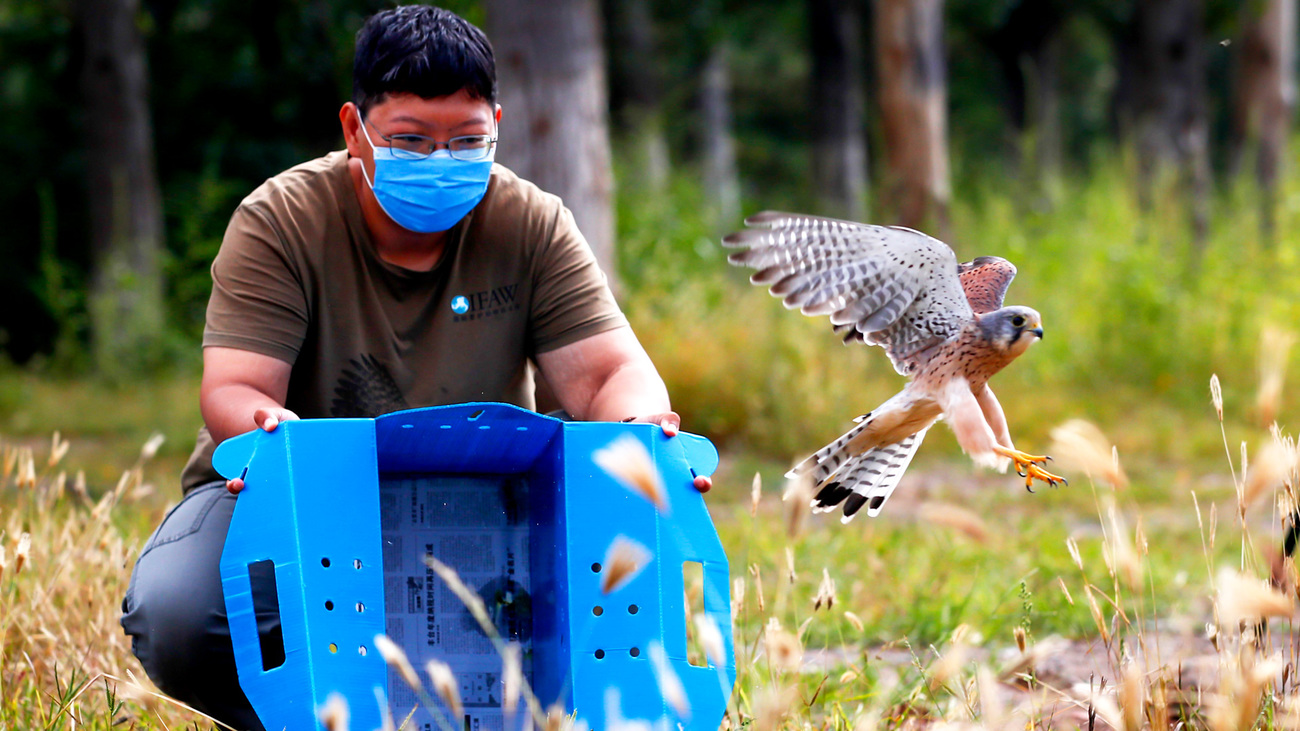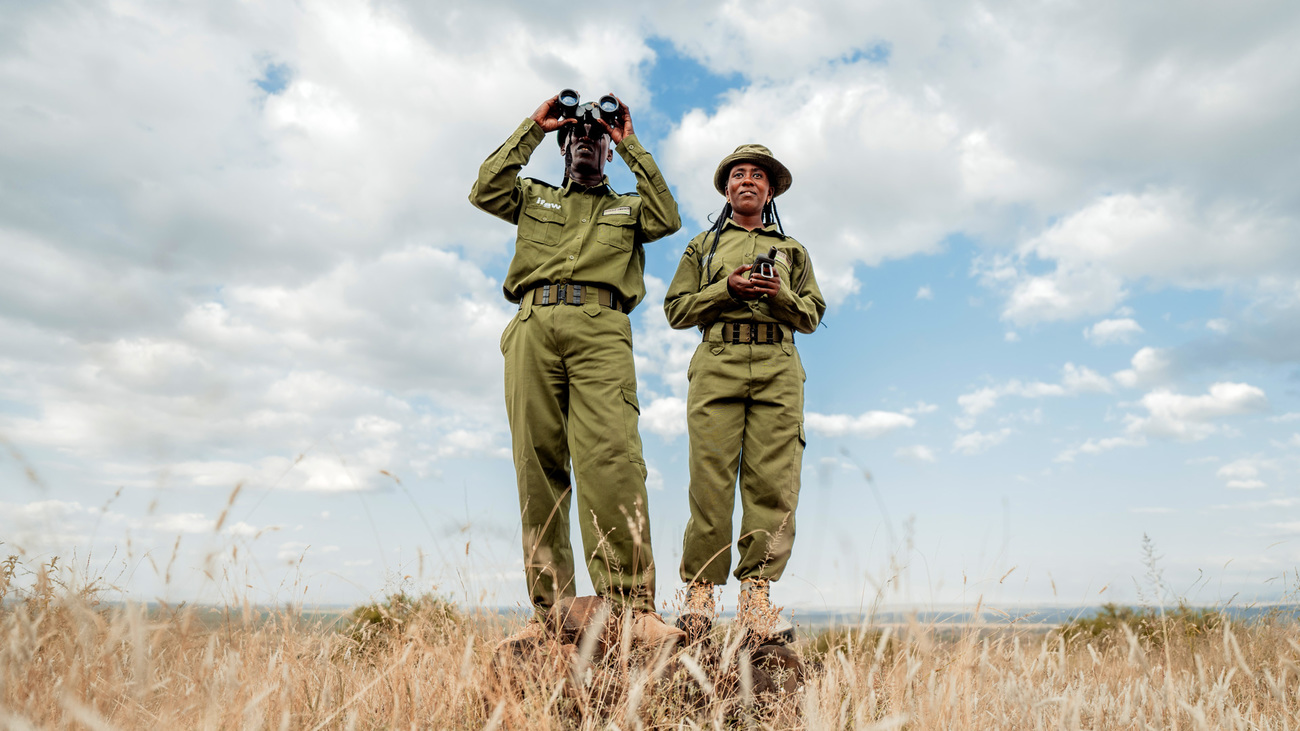Blog
Long’uro: one elephant’s story of immense resilience
Read more15 jobs that work with wild animals

From veterinarians to conservationists to zookeepers, this list encompasses a wide variety of jobs that work with wild animals, both directly and from a distance. Some of these jobs require college degrees and experience, while others are entry-level and may not require a degree. The people who do these jobs often feel fulfilled due to how they help endangered species, save individual animals’ lives, and contribute to a better future for wildlife and the planet. Keep reading for more details on all of these career paths.
Looking for ways to launch your wildlife career? You can also check out our blogs on how to get a job in wildlife conservation and marine conservation. You may be interested in starting with an internship or a volunteer opportunity. Check out IFAW’s volunteer and internship page to learn more about opportunities to work with our marine mammal rescue team in Cape Cod.
With that, here are 15 unique careers that allow you to work with and help wild animals.
Veterinarians are physicians for animals—they work to treat animals at regular and emergency appointments and protect public health through the care of animals. They also research, treat, and diagnose medical conditions and diseases found in pets, farm animals, and wildlife.
Most veterinarians are employed in private practice treating animals. Some are small animal veterinarians, treating animals in their office, while others are large animal veterinarians and travel around to farms, sanctuaries, and even natural land or ocean settings. Small animal veterinarians might treat cats, dogs, birds, rodents, and rabbits. Large animal veterinarians generally treat livestock and farm animals like cows, donkeys, goats, horses, and sheep. Wildlife veterinarians are trained to treat the wildlife during rescue and rehabilitation stages, including IFAW’s veterinarians at the Beijing Raptor Rescue Center in China, our marine mammal rescue team on Cape Cod, and through our partners such as Bonorong Wildlife Sanctuary in Australia, the Lusaka Elephant Nursery in Zambia, or the Centre for Wildlife Rehabilitation and Conservation in India.
To become a veterinarian, you have to complete a Doctor of Veterinary Medicine (DVM, VMD, BVS, BVSc, BVMS, or BVM) degree at an accredited college or university. First, you typically must complete a bachelor’s degree in a relevant field such as biology or zoology. Other careers under the veterinary umbrella that don’t require as advanced of degrees include veterinary technicians, veterinary assistants, and veterinary nurses. Other jobs in the veterinary field include animal nutritionists, veterinary surgeons, veterinary pathologists, veterinary nurses, and veterinary pharmaceutical sales representatives.

Wildlife biologists study animals and how they interact with their ecosystems. They may perform research, work as professors, and publish papers on research topics. Wildlife biologists may also study how humans impact the habitats of wild animals and the functioning of their ecosystems. Often, wildlife biologists study specific ecosystems or wildlife populations, such as an at-risk elephant population.
Zoologists are very similar to wildlife biologists, as they also study animals, their behaviour, and human impact on their habitats. However, where wildlife biologists tend to focus their studies on a specific area or population of animals, zoologists tend to narrow their research to a specific type of animals, such as monkeys or birds.
Wildlife biologists and zoologists typically need a bachelor's degree in biology, wildlife biology, or zoology. However, for more advanced work or to teach at a university, you may need to pursue a master’s or doctorate degree.
Wildlife conservationists are professionals who work for the protection of vulnerable wildlife species. They may engage in fieldwork, laboratory research, consulting, and policy advocacy.
Typically, becoming a wildlife conservationist requires a bachelor’s degree in biology, wildlife biology, zoology, or a related subject. You may also want to consider getting a master’s degree in a field like wildlife ecology or wildlife conservation.
A conservation officer is a law enforcement officer who works to protect wildlife and the environment. They are charged with protecting animals and natural resources, overseeing recreation areas, and enforcing environmental regulations. Other areas of their work include surveillance, search and seizure, investigating complaints, conducting safety courses, and writing reports.
To become a conservation officer, you typically must pass an exam. Most positions also require a bachelor’s degree, but some may only require an associate degree.
A field research assistant supports wildlife biologists, conservation biologists, and other types of scientists in their research projects. They may conduct literature reviews, manage data, maintain files, and assist with the physical, hands-on aspects of the research such as collecting samples and recording observations.
Typically, becoming a field research assistant in a wildlife conservation-related field requires a bachelor’s degree in biology, zoology, or a similar field.
Marine rescue officers assist in the rescue and rehabilitation of injured, sick, or stranded animals in the ocean. They often help transport animals like dolphins from the ocean to a facility where they can be treated. Marine mammals may need help due to situations of entanglement, vessel strikes, strandings, drought, or overheating.
More advanced marine rescue positions may require a degree, but getting started in this career path often starts with volunteering and internships. If you’re interested, check out IFAW’s volunteer and internship page to learn how you can work with our marine mammal rescue team.
Wildlife rehabilitators are people who care for injured and sick wild animals with the goal of releasing them back to the wild, if possible. They often work with veterinarians to identify illnesses and injuries and are responsible for round-the-clock care and feeding to keep these animals safe and healthy. Wildlife rehabilitation is certainly demanding, time consuming work, but it can also be incredibly rewarding.
An important part of being a wildlife rehabilitator is keeping wild animals wild. They limit human contact with the animals as much as possible and encourage them to develop the skills they need to survive in the wild. Rehabilitation also often involves socialising the animals with other members of their species.
Typically, becoming a wildlife rehabilitator requires a permit. It is illegal in many places to house and rehabilitate wild animals without proper permitting. To get started in your wildlife rehabilitation career, try volunteering with your local rehabilitation centres. You may also want to pursue a degree in wildlife biology, zoology, ecology, or veterinary medicine.
IFAW supports wildlife rehabilitators around the world in their efforts to rescue and release injured, sick, stranded, and orphaned animals. You can learn more about what it takes to be an elephant rehabilitator by checking out our ‘day in the life’ video. Wildlife rehabilitators are also a key part of our disaster response work.

An animal shelter technician or animal care technician helps take care of animals in settings such as labs, shelters, rehabilitation centres, or veterinary offices. Daily tasks involve monitoring animals’ health and logging any abnormalities or signs of illness, providing fresh food and water, cleaning cages, disinfecting the facility, stocking supplies, and assisting veterinarians with procedures like vaccinations.
Becoming an animal care technician typically does not require getting a college degree. A high school diploma and some experience working hands-on with animals is likely sufficient. Volunteering at animal shelter, sanctuary, or rehabilitation centre is a great way to gain experience assisting in the care of animals.
Animal health inspectors are charged with ensuring animals housed in farms, pet stores, shelters, laboratories, and other places are healthy and kept in clean, disease-free environments. A primary duty of animal health inspectors is rabies control in domestic animal populations. Even though they primarily work in proximity to domestic animals, animal health inspectors help keep wild animal populations safe when they ensure that farmers, pet stores, and other facilities are following the law. Inspectors are typically assigned to a specific region or city and give out licenses in that area.
Most animal health inspector jobs require a bachelor’s degree in zoology, animal science, biology, veterinary medicine, or a related field. Some inspectors are licensed veterinarians with doctorate degrees. Different states and countries have different degree requirements for their animal health inspectors. Animal health inspectors also typically have experience in livestock management or veterinary settings.
Wildlife rangers, also called park rangers, work in national parks, cultural sites, and other protected areas of land to protect and monitor the populations of wild animals that live there. Their work can be difficult and dangerous, and it might require time commitments away from one's home and family. Rangers go on daily and multi-day patrols across vast areas of protected landscapes, monitoring animal populations, preventing poaching, and responding to incidents of human-wildlife conflict. Rangers also work with local communities to resolve tensions between humans and animals and to educate and spread awareness about local species.
In addition to working to protect landscapes, wildlife rangers may also work in marine areas, protecting species from illegal fishing and boating activities. Learn how IFAW is helping local communities protect marine life in coastal Kenya.
Being a ranger is a complex career. IFAW works to support those who make the commitment to become a wildlife ranger, helping to provide housing, salaries, equipment, and training to ranger teams around the world.
The qualifications for becoming a ranger are different depending on where you live. In the US, national park rangers typically need to have either a bachelor’s degree or two years of post-secondary education combined with one year of specialised work experience. However, each state has its own unique requirements.
In many countries of East and southern Africa, many rangers hold bachelor’s degrees in zoology, biology, conservation biology, and other related fields, or they hold diplomas in nature conservation. Most rangers also then undergo professional training at a wildlife management agency facility or a training academy.
In India, you must take the Union Service Public Commission (USPC) exam to become a forest ranger. To qualify for the exam, you must hold a bachelor’s degree in any discipline, though it’s recommended to have a degree in zoology, botany, chemistry, physics, statistics, veterinary science, biology, forestry, agriculture, or animal husbandry. Candidates must pass the USPC exam and then complete a compulsory training course.

Marine biologists are scientists who study the ocean and its life, including animals, plants, algae, plankton, and more. They often engage in fieldwork, which may involve diving in the water. They also work in labs and educational settings. Becoming a marine biologist requires at least a bachelor’s degree in the field, and a more advanced degree for positions like a professor.
Wildlife capture and relocation workers help move wild animals to safety or out of human-settled areas. They help rescue and escort these animals to wild places where they can find food, water, shelter, and other members of their species. Capture and relocation workers are crucial to mitigating human-wildlife conflict, and they can also help species thrive by relocating them to less-populated areas.
The requirements for working in animal control and wildlife relocation vary by state and country. Check with your local laws to see how you can start a career in wildlife relocation.
Zookeepers, also called animal keepers, are experts in animal behaviour, care, and handling. They manage the wild animals that are kept at a zoo. They are typically responsible for daily feeding, care, and cleaning.
Most zookeepers have bachelor’s degrees in biology or zoology. Some zoos offer internships or volunteer opportunities you can take while you’re earning your degree to gain hands-on experience. Being a zookeeper involves a lot of physical activity, so consider this when thinking about starting your career as a zookeeper.
Wildlife specialists perform work to maintain the habitats of wild animals. They design and implement habitat improvement projects such as tree plantings, water level management, and prescribed fires. They also perform population surveys of wild animal populations, manage access to public lands, educate and inform local communities, maintain equipment like ATVs, conduct surveys of public land use, and inform local policies like hunting seasons.
A Geographic Information Systems (GIS) analyst is someone who uses technology to create digital maps. GIS analysts have skills in programming, data analysis, and cartography (map making). Working in environmental fields, GIS analysts create maps and compile data that can be used in conservation projects to track patterns of wildlife and other important information.
GIS analysts typically hold bachelor’s degrees in computer science, geography, geoscience, surveying, engineering, or other related fields. Many GIS analyst jobs require applicants to have completed GIS analyst internships. They also typically require proficiency in computer programming languages like SQL, R, Python, CSS, HTML, JavaScript, and various mapping languages; experience with mapping tools like QGIS and Carto; experience with GPS measuring tools; and good mathematics, communication, and problem-solving skills.
All these careers can be great options if you’re interested in working with wildlife or supporting their conservation. If you’re interested in learning more about volunteer opportunities with IFAW, check out our volunteer page.
If you’re looking to protect wild animals at home, check out our blog on how to help endangered species.
You can also support wildlife and take action for animals by signing one of our petitions.
Every problem has a solution, every solution needs support.
The problems we face are urgent, complicated, and resistant to change. Real solutions demand creativity, hard work and involvement from people like you.
Unfortunately, the browser you use is outdated and does not allow you to display the site correctly. Please install any of the modern browsers, for example:
Google Chrome Firefox Safari